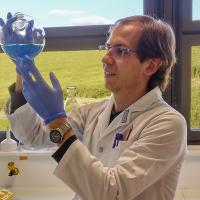
Agroecology Reading time 3 min
Jean-Félix Dallery, a young biologist studying phytopathogenic fungi
Published on 07 September 2020
Identifying fungal metabolites
Jean-Félix Dallery was recruited by competitive examination by the Plant Health and Environment division as a research scientist, and in 2019 took up his position in the Biology and Risk Management in Agriculture Unit, a reference centre for research on fungal diseases of field crops. He is part of the Effectors of Fungal-Plant Communication team, whose main objectives are to understand the mode of action and plant targets of fungal effectors and the communication mechanisms between fungi and plants.
His objective is to identify the fungal secondary metabolites involved in the infectious process of phytopathogenic fungi and to characterize their role and mode of action. He must overcome technical and biological barriers to carry out his research, because the fungi produce molecules exclusively when they infect plants. To do this, he is developing synthetic and molecular biology approaches for a laboratory-based production using the Saccharomyces cerevisiae yeast species.
With this project, Jean-Félix Dallery would like to demonstrate how, where and when these secondary metabolites are produced, and to study the dynamics of molecules in diseased tissues. This again requires overcoming a technical barrier, by detecting molecules directly within infected plant tissues by combining microscopy and mass spectrometry. This study will provide a more detailed understanding of the mode of action of fungal metabolites.
From plant to fungi
Thanks to a laboratory-immersion module during his biology degree and discussions with teacher-researchers, Jean-Félix Dallery discovered the fascinating life in a lab. Driven by a desire to understand how things work as well as by his interest in plants and micro-organisms, he went on to study plant biology. He did a PhD at the INRAE Versailles-Grignon Research Centre on the study of the secondary metabolism of the fungus responsible for anthracnose in cruciferous plants. Following his PhD, he pursued post-doctoral studies at the Institute of the Chemistry of Natural Substances of the CNRS in order to expand his knowledge.
Jean-Félix Dallery is extremely enthusiastic about his job and the diversity of tasks it leads him to perform. For him, fungi are an important source of substances with interesting properties. But this resource remains very under-exploited and several hundred thousand secondary metabolites remain to be discovered. The research carried out by the researcher has an interdisciplinary scope because the isolated natural substances can be of interest to actors in the agronomy, environmental or even pharmaceutical sectors.
Mini CVSince 2019 Research scientist at INRAE’s Biology and Risk Management in Agriculture Unit (BIOGER), Effectors of Fungal-Plant Communication team, Thiverval-Grignon, France |
